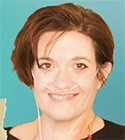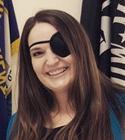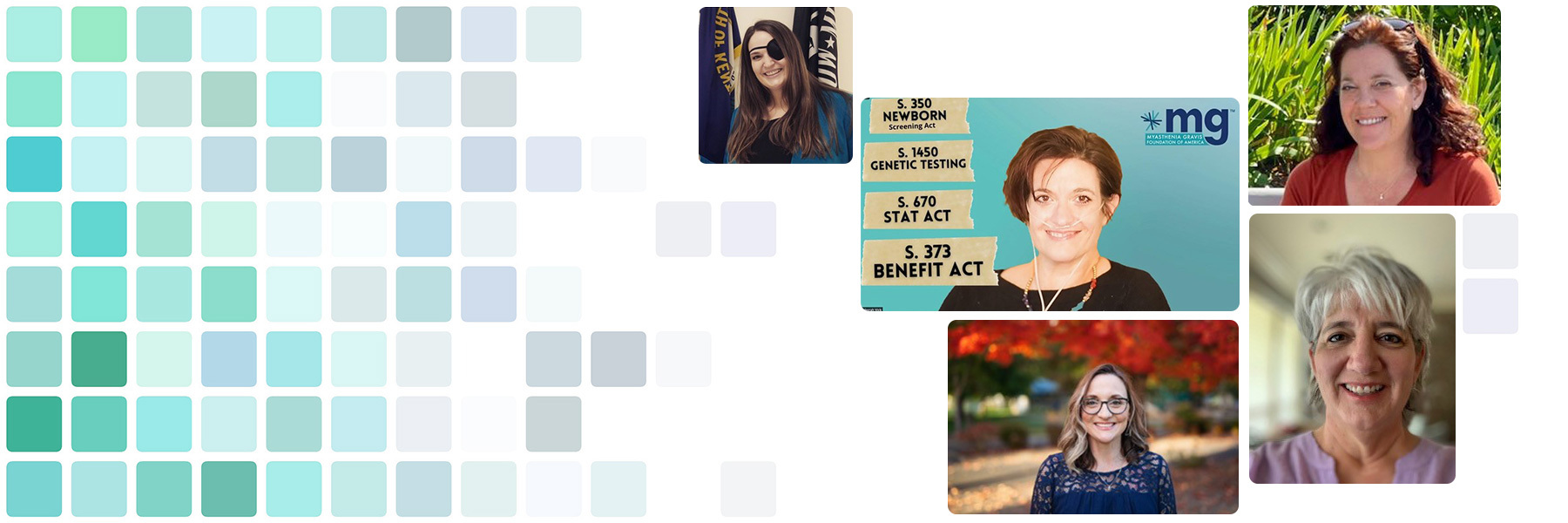The EveryLife Foundation hosted its annual Rare Disease Week meetings from July 14th to 22nd 2021, and several dedicated and committed MG patient advocates from the MGFA Our MG Voice advocacy program participated this year. These virtual meetings, conducted online for the second year in a row, helped to connect rare disease patients with key members of the United States Congress in order to discuss important issues, policy changes, and medical challenges facing the rare disease community.
There is power in numbers, so MGFA partnered with The EveryLife Foundation to ensure MG-related issues are always “on the table” during these advocacy meetings.
Our MG volunteers wanted to talk about their positive, inspiring experiences, and several volunteers are brand new to this program!
Tammy Menter – Baton Rouge, LA
 This was my first time attending this conference. I became both a sponge and sieve during the week. As a patient with a 16-year history with Myasthenia Gravis (MG), it was important to learn when and how policy makers learn and become aware of rare diseases. I was able to soak up knowledge that impacted my MG and sort away misconceptions I had developed regarding public health.
This was my first time attending this conference. I became both a sponge and sieve during the week. As a patient with a 16-year history with Myasthenia Gravis (MG), it was important to learn when and how policy makers learn and become aware of rare diseases. I was able to soak up knowledge that impacted my MG and sort away misconceptions I had developed regarding public health.
My biggest take away from the conference was HOW to become an effective and meaningful advocate. It’s complicated, in the sense that all rare diseases don’t fit into a one-size-fits-all category. It’s tough because the individual determines where their strengths lie and how to use them to their advantage. It’s as simple as one well-versed phone call or one flyer which includes critical information that can change the opinion of many. It was surprising to learn the wealth of resources currently available to be a part of or a contributing member for various groups.
Bottom line is the body of knowledge that currently exists for MG is leaps and bounds from 16-years ago. I’m grateful for the opportunity to attending such a comprehensive format for learning more about the future.
Deborah Vick – Chula Vista, CA
 This year has been a very unique one as we learn to embrace the use of technology to create accessible Virtual Events. Rare Disease Week fully embraced the use of virtual platforms to create a fun learning, networking and advocacy platform. As I was recovering from a spinal surgery, the ability to access this advocacy platform virtually was very much welcomed and the only way in which I would have been able to advocate.
This year has been a very unique one as we learn to embrace the use of technology to create accessible Virtual Events. Rare Disease Week fully embraced the use of virtual platforms to create a fun learning, networking and advocacy platform. As I was recovering from a spinal surgery, the ability to access this advocacy platform virtually was very much welcomed and the only way in which I would have been able to advocate.
It was truly amazing to see so many familiar faces in our advocacy community while still meeting new ones. In fact, during some of the networking rooms and trainings’, I encountered several other MG Advocates. The added benefit of the virtual advocacy is the ability to include my younger son during several of the advocacy meetings with legislative staff for several House Congressional Members.
I advocate for the MG Community in hopes that sharing our stories, struggles and need for legislative support will help to expedite research and/or treatments that will enhance our lives. More often than not, legislative staff members have not heard of MG. Those that have are not fully aware of the impact MG can have on the patient and/or their family. We know the strongest impact one can have is to share their story. When we can tie our story into that of a legislative act, it can be extremely powerful. I have advocated for several pieces of legislation. First and foremost, I advocate for the S.T.A.T. Act, the Benefit Act and the Newborn Screening Act.
Laura Chandler – Brookline, NH
 As a Myasthenia Gravis patient (or family member/friend/caregiver), we are already Rare Disease Advocates. Many of us have to advocate for ourselves in everyday life. We have to find ways to make MG make sense to our friends, families, coworkers, and doctors. This part sometimes makes me feel very vulnerable; having to share the shortcomings of my body, my career, my life, and sometimes my worst fears. But, using my story to effect change is a way to flip that script and bring empowerment to the patient experience. I encourage every MG-er to practice advocacy in our everyday lives by telling their MG story and being honest and vocal about their needs. For me, this process entailed finding a way to explain MG in everyday terms and becoming comfortable sharing how it has affected my life.
As a Myasthenia Gravis patient (or family member/friend/caregiver), we are already Rare Disease Advocates. Many of us have to advocate for ourselves in everyday life. We have to find ways to make MG make sense to our friends, families, coworkers, and doctors. This part sometimes makes me feel very vulnerable; having to share the shortcomings of my body, my career, my life, and sometimes my worst fears. But, using my story to effect change is a way to flip that script and bring empowerment to the patient experience. I encourage every MG-er to practice advocacy in our everyday lives by telling their MG story and being honest and vocal about their needs. For me, this process entailed finding a way to explain MG in everyday terms and becoming comfortable sharing how it has affected my life.
Advocacy on Capitol Hill is similar, but it connects our story to our needs in terms of policy. During Rare Disease Week, this entails meeting with your representative or a member of their staff. You'll have time for a 1-2 minute “pitch” or “elevator speech” in which you explain the disease, give your story and how it has affected your life, and make an “ask.” Your ask is a request to support policy that effects not only those with Myasthenia Gravis, but the Rare Disease community of over 7000 other Rare Diseases as well.
This was my second time participating in Rare Disease Week. I encourage all fellow MGers to practice being vocal about your story with Myasthenia Gravis in whatever way bests help you to express your experience and your needs. Myasthenia Gravis Foundation of America and Rare Disease Legislative Advocates both provide excellent resources to help on this journey.
Cara Brown – Grants Pass, OR
 This is my first time attending Rare Disease Week! Although it was virtual, Rare Disease Week was very informative and interactive. They had mentors for new advocates to help guide us through the process and prepare us for our meetings with Congress. I had a great time, met wonderful people, and learned what is happening in legislation in regard to Rare Diseases.
This is my first time attending Rare Disease Week! Although it was virtual, Rare Disease Week was very informative and interactive. They had mentors for new advocates to help guide us through the process and prepare us for our meetings with Congress. I had a great time, met wonderful people, and learned what is happening in legislation in regard to Rare Diseases.
I choose to advocate for the MG community because I am a patient and I have become close to my fellow MG Warriors. Together we are stronger. Raising awareness by participating in Rare Disease Week and having the opportunity to meet with Congress in hopes of being apart of new legislation that will benefit everyone in the Rare Disease Community including those with MG. I advocated for the Speeding Therapy Access Today (STAT Act), the Newborn Screening Saves Lives Reauthorization Act, and the Access to Genetic Counselor Services Act.
Elizabeth Shannon – Wolfeboro, NH
 I recently had the pleasure of attending Rare Disease Legislative Advocacy Week 2021. This is the first time I have participated in the event. Although the meetings were held remotely by, I think it was an incredible experience. I became involved in Rare Disease Advocacy when I was appointed to the State of New Hampshire Rare Disease Advisory Council. I serve in the capacity of patient advocate as a “person living with a rare disease.” I was diagnosed with Myasthenia Gravis in 2010 and am doing well with treatments. I feel it is very important to advocate for all rare diseases and being an MG patient, I can share my personal experiences and insights to help others cope with the daily challenges we face. This position also allows me to represent the MG community by helping influence legislation that will improve our care outcomes.
I recently had the pleasure of attending Rare Disease Legislative Advocacy Week 2021. This is the first time I have participated in the event. Although the meetings were held remotely by, I think it was an incredible experience. I became involved in Rare Disease Advocacy when I was appointed to the State of New Hampshire Rare Disease Advisory Council. I serve in the capacity of patient advocate as a “person living with a rare disease.” I was diagnosed with Myasthenia Gravis in 2010 and am doing well with treatments. I feel it is very important to advocate for all rare diseases and being an MG patient, I can share my personal experiences and insights to help others cope with the daily challenges we face. This position also allows me to represent the MG community by helping influence legislation that will improve our care outcomes.
During Rare Disease Week, I had the honor of meeting with the staff of Representatives from State of New Hampshire, including Congressmen Chris Pappas, Congresswoman Ann Kuster, and Senator’s Maggie Hasson and Jeanne Shaheen. I used the opportunity to advocate for support of the “21st Century Cures Act 2.0”, which is currently in discussion on the Senate Floor.
As many Myasthenia Gravis patients are immunosuppressed, it was especially important for them to be able to continue care without being subjected to the risk of contracting Covid -19. Unfortunately, these extended benefits will end when the Public Health Emergency expires. Long term solutions are necessary, and steps should be taken to ensure the 1135 Blanket Waivers given to Health Care Agencies, by the Centers for Medicare and Medicaid (CMS) , remain in place.
Congressional and Senate support for the “21st Century Cures Act 2.0” as well as the “Telehealth Modernization Act” will allow patients with Myasthenia Gravis, who use Medicare and Medicaid Services to continue to use Telehealth Services. Additionally, many MG patients have specialists and neurologists who are not geographically close to their homes. Therefore, these services work incredibly well for follow up visits. They are also helpful because, at times, a physician may be able to ascertain a patients’ status through a telehealth video call. It would be incredibly helpful for Rare Disease Patients and Caregivers to continue using these services long after the pandemic ends.

